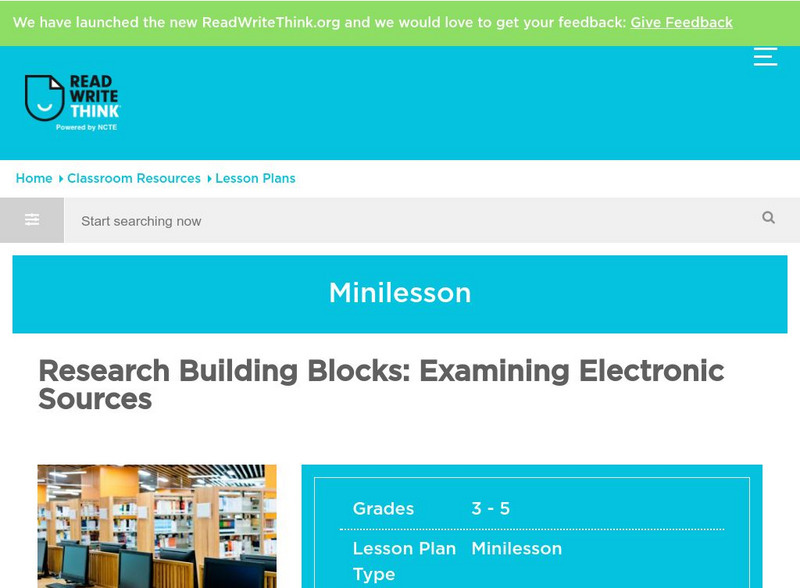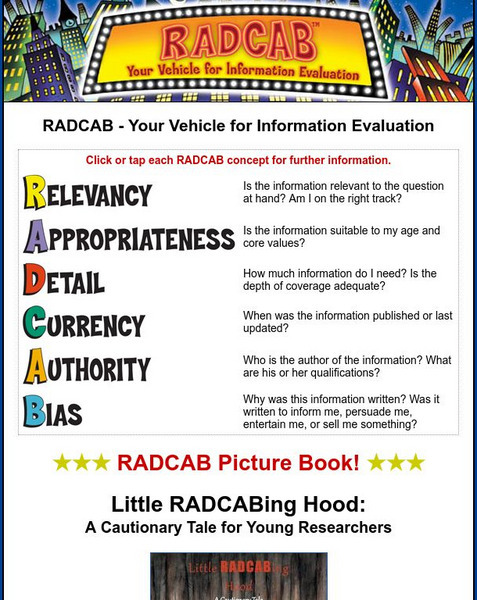Hi, what do you want to do?
PBS
Pbs Learning Media: Teachers' Domain
Teachers' Domain is a multimedia digital library for the classroom that provides learning experiences in ways no textbook can. This ever-expanding library currently includes collections on: Science: Life Science, Physical Science,...
PBS
Pbs Learning Media: Molly of Denali: Veggiezilla! Game
This digital game extends students' use of informational text and their knowledge of Alaska. In this game, Molly and Trini have planted various vegetables to eat and enter to win prizes at the Alaska State Fair. Through a variety of...
PBS
Pbs Learning Media: Molly of Denali: Collection
Informational text and Alaska Native culture form the basis of the groundbreaking MOLLY OF DENALI series and its educational resources. The MOLLY OF DENALI collection offers videos, digital games, lessons, teaching tips, and activities...
Common Sense Media
Common Sense Media: Education: Using Keywords (K 2)
[Free Registration/Login Required] Students understand that keyword searching is an effective way to locate information on the Internet. They learn how to select keywords to produce the best search results to meet their goals. Then they...
National Geographic Kids
National Geographic Kids: Tricky Pics
Test your awareness of truth and illusion in visual images by viewing these six tricky photos. This resource demonstrates that you can't always believe what you see. To help you learn how to discriminate between real and fake, the...
Science Buddies
Science Buddies: How Many Numbers Can You Remember?
Most people don't even remember phone numbers anymore, and instead program them into their phones. There is a limit to the number of numbers, or digits, that most people can remember. Try this experiment to test your digit span, the...
Other
Pbs Newshour Extra: Student Reporting Labs
Think. Create. Inform. You become the reporter. PBS connects high school students to local PBS Stations and news professionals to produce original, student-generated news video reports. Get involved and learn how to report, problem-solve...
Better Lesson
Better Lesson: I Learned It Online
Preparing the new generations for college and career readiness absolutely requires us to ensure our children are competent and comfortable in the use of a variety of digital tools. Students will be learning about a topic online and...
Texas Education Agency
Texas Gateway: Evaluate Graphics in Informational/procedural Text
You will learn how to evaluate graphics for their clarity in communicating meaning and achieving a specific purpose.
Other
Connect Safely: Connect Safely: Smart Socializing Starts Here
This resource offers students and adults information in order to help young people socialize safely online.
Common Sense Media
Common Sense Media: Education: Lesson Plan: Powerful Passwords
Students learn the benefits of using passwords and then play a board game to discover some strategies for creating and keeping secure passwords. Requires free membership.
Other
Think U Know
Think U Know offers great interactive resources for kids on staying safe while having fun in chat rooms online. Here you will learn the facts through fun and exciting characters! A parent's page is also included.
PBS
Pbs Learning Media: The Game: Decisions on Deadline
This lesson explores Decisions On Deadline, a free, fun, and fast-paced browser and tablet-based game where players take on the role of journalists running down stories, working against time and a limited budget while navigating a string...
Other
Say Cheese: Information on Digital Imaging
This is a site about digital imaging. There are nice tips on equipment, links to photographer's bios and simple instructions to every step along the way of digital imagery.
ReadWriteThink
Read Write Think: Research Building Blocks: Examining Electronic Sources
This lesson helps elementary students identify the important components of web site evaluation. It includes a website evaluation question sheet.
Texas Education Agency
Texas Gateway: Synthesize Ideas in Informational/expository Text
[Accessible by TX Educators. Free Registration/Login Required] Learn how to synthesize and make logical connections between ideas within a text and across two or three texts representing similar or different genres and to support the...
Other
Plu: Designing and Delivering Multimedia Presentations: Why Use Visuals?
The advantages to incorporating visuals into a multimedia presentation are explained. SL.9-10.5 Audio Visuals. CCSS.ELA-Literacy.CCRA.SL.5, SL.11-12.5 Audio Visuals
Sophia Learning
Sophia: Research Questions: A Focus for Planning, Researching, and Writing
This Sophia video lesson introduces how to develop good questions for a research paper. CCSS.ELA-Literacy.CCRA.W.8; CCSS.ELA-Literacy.WHST.6-8.7 Conduct short research projects. CCSS.ELA-Literacy.WHST.6-8.7 standards are addressed in...
Science Education Resource Center at Carleton College
Serc: Bio Media Associates: Learning Programs for Biology
This site provides photographs, animations, essays, teaching resources, multimedia, and other information about biological systems and organisms. It features a monthly contest and quiz in which students and teachers identify a mystery...
Other
American Film Institute
The online home of the American Film Institute publishes information about its activities, which involve educating audiences and future generations of filmmakers and recognizing excellence in the art of film, broadcast, and digital media.
Other
Online Journalism
Use this site for analyzing the effectiveness and techniques of several aspects of web news. Pop up windows guide viewers to important questions about what they will view.
Other
The Digital Scoop: Using Skitch in Kindergarten
In this article, a teacher explains how she taught kindergarten students to take photographs. They were then shown how to open an iPad app called Skitch and add words to accompany their pictures. This was followed by a Math activity...
Other
Radcab: Your Vehicle for Information Evaluation
How do you know you are using a trustworthy source when writing a research paper? Use this acronym for easy questions to ask yourself to make sure you have a reliable source. Click on each one for further details.
Common Sense Media
Common Sense Media: Best Tech Creation Tools
Check out this list of terrific tools for tech creation that offer a wide variety of engaging end products kids can create, from stories to animations to music to games.


















